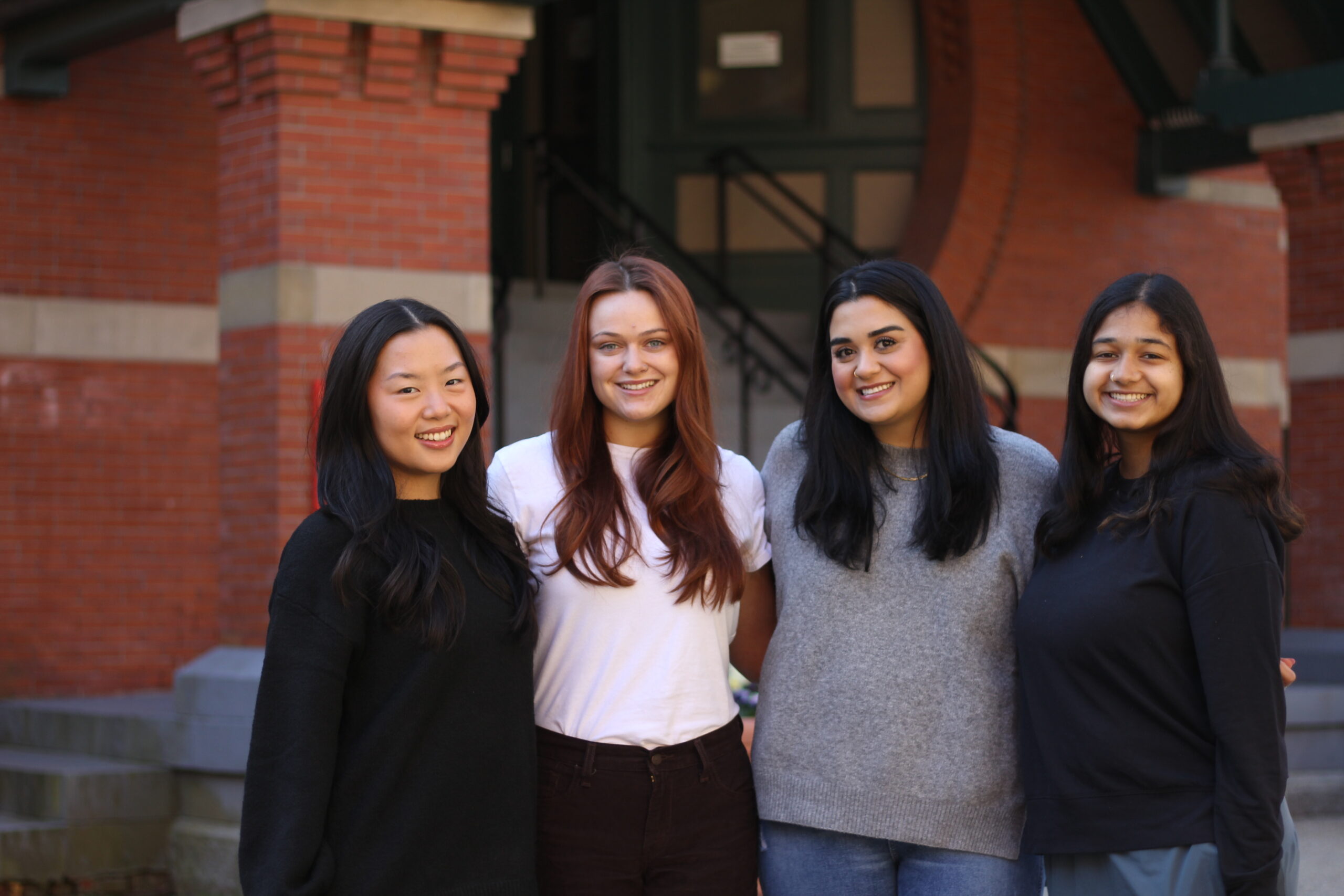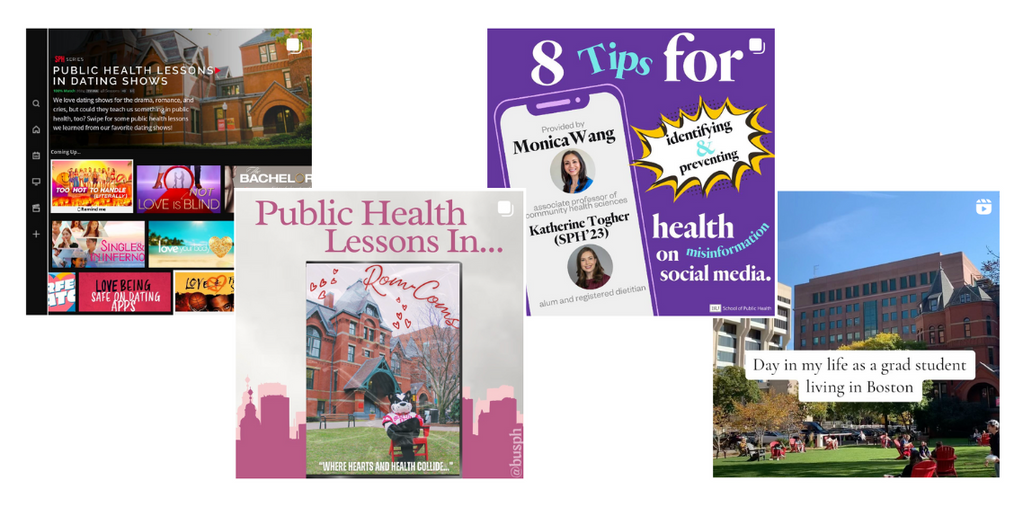Meet SPH’s Student Content Creators.

Meet SPH’s Student Content Creators
Gwenyth Ip, Audeaneh Saberi, and Kavya Ganugapati craft reels, infographics, and other fun and engaging social media content to highlight education, research, and practice at the School of Public Health.
Student content creators Gwenyth Ip, Audeaneh Saberi, and Kavya Ganugapati (from left to right) with Summer Kaeppel (second from left), SPH’s social media and digital specialist. Photo by Kelly Culnan.
The U.S. news media landscape is constantly evolving. News consumption via traditional channels, such as television, radio, and newspapers, is down, while news consumption via digital devices is up. For better or for worse, half of all U.S. adults report getting news from social media, and the proportion is even greater among young people. In this new era of communications, strategies for engaging audiences have changed dramatically, prompting the School of Public Health to enlist new messengers to promote its mission to the masses.
In 2023, SPH welcomed its inaugural cohort of student content creators tasked with crafting reels, infographics, and other fun and engaging social media content to highlight education, research, and practice. What was once largely a solo operation spearheaded by Summer Kaeppel, the social media and digital specialist in SPH’s Office of Marketing and Communications, has since transformed into a collaborative team effort. Now, three students dedicate five to ten hours per week to brainstorming, designing, and producing material for SPH’s Instagram, TikTok, LinkedIn, and Facebook profiles.
“The original reason we sought out student creators was to make our social media presence more representative of who the SPH community is and what it is about,” says Kaeppel. In 2022, 85 percent of current students reported regularly using Instagram, and over 70 percent said they referred to the SPH’s social media accounts as part of their decision-making process to enroll at the school.
“Content creation was the perfect way for me to bridge my passion for public health with making art and engaging with a lot of cool people,” says Kavya Ganugapati, who became SPH’s first student content creator when she began her role in May 2023. “My favorite part is probably getting to talk to different people and making people smile with content.”
Students like Ganugapati, who studies healthcare management in SPH’s Master of Public Health (MPH) program, are uniquely positioned to showcase campus life and translate research for lay audiences—activities essential to building and sustaining trust in public health, which surveys show has declined in recent years.
After the recent Alabama Supreme Court ruling in LePage v. Center for Reproductive Medicine, Ganugapati made a video explaining the watershed decision, which recognizes frozen embryos as children under state law. She expressed gratitude for the opportunity to both hone her video editing skills and learn more about the implications of the ruling from an expert, Nicole Huberfeld, the Edward R. Utley Professor of Health Law, Ethics & Human Rights and co-director of the BU Program on Reproductive Justice.
@bostonusph #CapCut Recently, the Alabama Supreme Court has ruled that frozen embryos created during fertility treatments should be considered children. SPH’s Nicole Huberfeld shares how this decision was reached and the implications that it could have on public health. #publichealth #health #bostonuniversity #news #student ♬ original sound – BU School of Public Health
“Social media provides so much perspective. It can be a great tool for learning and education,” says Audeaneh Saberi, an MPH student in epidemiology and biostatistics. Saberi and Gwenyth Ip, an advertising student in BU’s College of Communication, joined Ganugapati as student content creators in October 2023, rounding out what has since proven to be an all-star team. Kaeppel reports that post engagement (the sum of likes, comments, and saves) on SPH’s Instagram, for example, is up more than 250% from last year.

In her first TikTok for the School and one of her most popular posts to date, Saberi invites viewers to “get ready with her” as she shares her experience as an ex-vaper turned public health student, using the popular #GRWM trend to educate people on the long-term health effects of e-cigarettes, promote stronger consumer protections against dangerous additives used to flavor these products, and encourage users ready to quit.
@bostonusph GRWM while I tell you about my experiences as an ex-vaper turned public health student. You can learn more about studies referenced on our website Bu.edu/SPH #vaping #vapingfacts #bu #publichealth #gradstudent #publichealthstudent #quittingvaping #bostonuniversity #juul #publichealtheducation #fyp ♬ original sound – BU School of Public Health
“We can inform people about what is happening in the world of public health in small digestible ways,” says Saberi. Ip agrees.
“By being able to pair a video or infographic with a research article, I believe it helps visually translate research in a manner that aids understanding. As a visual learner myself, I think there is more we can do to support those who may not fully understand information through words alone,” says Ip. She also points out that because social media is free and open to everyone, posting public health content increases accessibility to information that might otherwise only live in dense academic journals, locked behind paywalls.
“I love that our digital landscape has transformed into a space where people can laugh, be educated, and have a good time,” Ip says. Her favorite creation to date is an infographic she calls “SPH Wrapped,” inspired by Spotify Wrapped, the audio streaming service’s viral annual marketing campaign providing listeners with data on their top genres, artists, and other activity over the past year. Ip’s version lists the School’s nine departments as its “top genres” and a selection of students, faculty, and alumni whose work was featured in stories published by SPH in 2023 as its “top artists.”
Another infographic Ip created takes inspiration from the game show Jeopardy to highlight SPH scholarship linking oil and gas flaring and venting activities to $7.4B in health damages. Jonathan Buonocore, an assistant professor of environmental health and a co-author on the study, says the post was “amazing” and gave Ip a “triple A+” for her clever design.
While Kaeppel anticipated that the student creators’ varied experiences and fresh perspectives would amplify the reach and resonance of the SPH scholarship, their influence has exceeded her expectations.
“With their passion and creativity, we have been able to showcase the spectrum of our community’s work. From reproductive health to the public health implications of marketing at the Super Bowl, they let their personal public health interests guide them in creating important, informative, and sometimes funny content,” says Kaeppel. “They are also just fun, intelligent students who have added a lot of meaning to my role as social media specialist. In December 2023, an Instagram reel they all collaborated on garnered over 800k views. It was really exciting to have a ‘viral moment’ like that, and without the students, it would not have been possible.”
With Ganugapati and Saberi poised to graduate in May 2024, Kaeppel is seeking new student content creators to fill their shoes. To learn more about upcoming openings for these and other similar roles, please email skaeppel@bu.edu.
